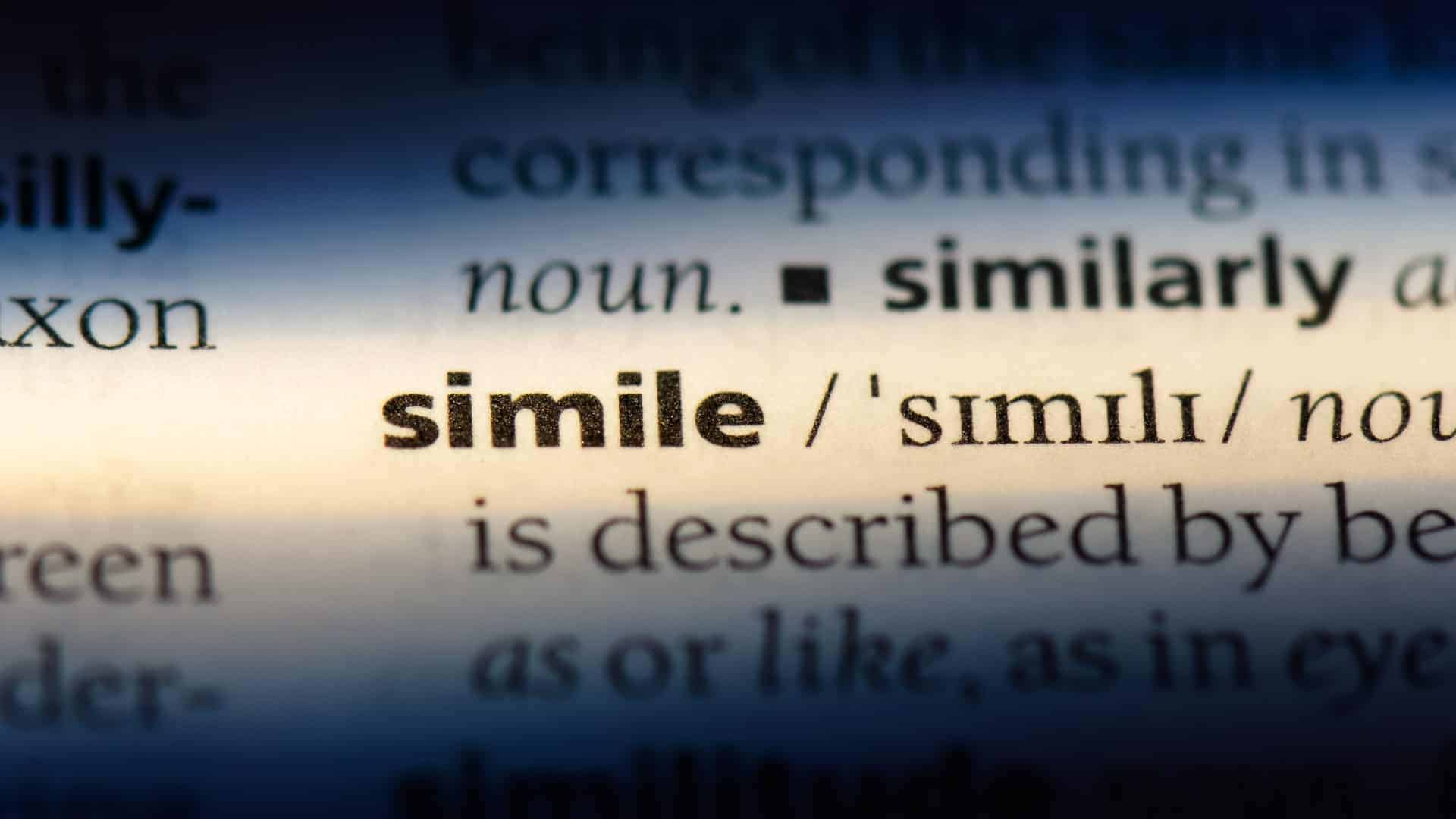I grew up in Bloomington, Illinois, the home of State Farm Insurance. Living in the shadow of its worldwide headquarters made two impacts upon my life. First, my sisters and I were oddities because neither of our parents worked for State Farm. Second, I’ve had the State Farm jingle stuck in my head for roughly 84% of my entire life. You know the one: “Like a good neighbor, State Farm is there.” While I can’t say that Bloomington was filled with friendlier neighbors than any other American town, I can tell you that I’ve never had to search far and wide for a simile definition thanks(?) to that catchy, simile-filled slogan.
If you’re ready for a refresher on the ins and outs of similes, tighten your safety belt, check your mirrors and let’s get moving.
Simile Definition
A simile is a figure of speech that compares two things using “like” or “as.” When your teenage son gets up at 3:00 p.m. and grunts that he “slept like a log,” he’s using a simile. If you grouse that your self-centered ex-girlfriend was “as cold as ice,” you’re using a simile. (You might also be the lead singer of Foreigner.)

What Is a Simile?
Here’s another simile definition to tuck away in your mental sock drawer: A simile uses adverbs to compare two seemingly different things in order to describe one of those things. The keyword here is “seemingly.” The whole point of this literary device is to achieve a more precise and engaging level of description.
Let’s go back to that “cold as ice” example for a chilly second. The writer could’ve just said, “My ex-girlfriend was cold” or “My ex-girlfriend was distant.” Instead, the writer pegs her “as cold as ice.” Ouch! That’s a far more vivid and interesting way to describe a former flame.
It also creates a more detailed description without piling up a traffic jam full of adjectives. Here’s what I mean: What words come to mind when you think of ice? Your list probably includes some of the following adjectives:
- Hard
- Frigid
- Frosty
- Raw
- Biting
- Sleek
- Chilled to the bone
None of these are especially pleasant when applied to a person unless he or she has some seriously sleek hair. Therefore, saying someone is “as cold as ice” does way more than describe him or her as cold. It also evokes and applies a litany of other unpleasant modifiers.
Simile vs Metaphor
If you want to get all technical about things, a simile is a type of metaphor. Metaphors compare two unlike things in order to describe one thing as the other. Similes do that, too. The difference is that in order for such a comparison to be a simile, it has to use “like” or “as” or another adverb to make that comparison. As such, similes are generally considered their own entity instead of a subset of metaphor.
Let’s look at these two figures of speech head-to-head, smackdown style. The topic? Life itself.
First up, a simile about life from Joseph Campbell (you know, the “Hero’s Journey” guy):
- “Life is like arriving late for a movie, having to figure out what was going on without bothering everybody with a lot of questions, and then being unexpectedly called away before you find out how it ends.”
Campbell compares living one’s entire life to showing up late for a movie — and he does so using “like,” which makes it a simile.
Next up, a metaphor about life from Truman Capote (a.k.a. the “In Cold Blood” guy):
- “Life is a moderately good play with a badly written third act.”
Here, Capote compares life not to a movie but to a play, and he does so directly. That absence of an adverb linking the two ideas is what makes it a metaphor. Both writers express somewhat similar sentiments regarding life, but they do so using two different figures of speech.

Simile Examples
Communication (both written and verbal) is saturated with similes. Take a second to check out some of the most common similes in action below:
- Jen and Courtney are like two peas in a pod.
- My driver’s ed teacher is as blind as a bat.
- Luke worked like a dog to put himself through college.
- Whatever happened to J.C. Chasez? He sings like an angel.
- My grandmother thinks Bob Barker is as cool as a cucumber.
- She also thinks he’s as hot as hell.
- Did I mention that my grandmother drinks like a fish?
Most of the time, similes use “like” or “as” to get the job done. Occasionally, other adverbs sneak in there:
- Anthony’s love of vintage Beanie Babies is deeper than the ocean.
- Vanessa played her guitar solo as if possessed by Jimi Hendrix himself.
Don’t Feel Like You Have To Stick to the Simile Script
While literature, pop music and advertising offer plenty of recognizable similes, that doesn’t mean you have to recycle them in your own work. The beauty of this literary device is that there’s no limit to the creativity you can inject straight into a comparison’s veins.
Take writing, for example. I think we can all agree that it’s pretty difficult, at least most of the time. (Thanks writer’s block.) You could say:
- Writing is hard.
True but boring. Let’s whip up a simile.
- Writing is like pulling teeth.
OK, that’s better, but we’ve also heard that phrase — “like pulling teeth” — roughly 432 times. Here’s a more creative and specific simile from screenwriter Lawrence Kasdan, one of the minds behind “Raiders of the Lost Ark” and several installments of the “Star Wars” franchise:
- “Being a writer is like having homework every night for the rest of your life.”
Nailed it, Larry. Maybe that’s why he has four Oscar nominations.
All three of these sentences express the same fundamental thought, but reading from top to bottom, they do so in increasingly engaging, original and descriptive ways.

Summing Up the Simile Definition
Similes are flexible figures of speech. There are virtually no limits on the creativity you can use to craft an interesting and insightful comparison.
Do you have a unique simile definition? How about a favorite Foreigner jam? Make like a jukebox hero and sound off in the hot-blooded comments below!


Leave a Reply